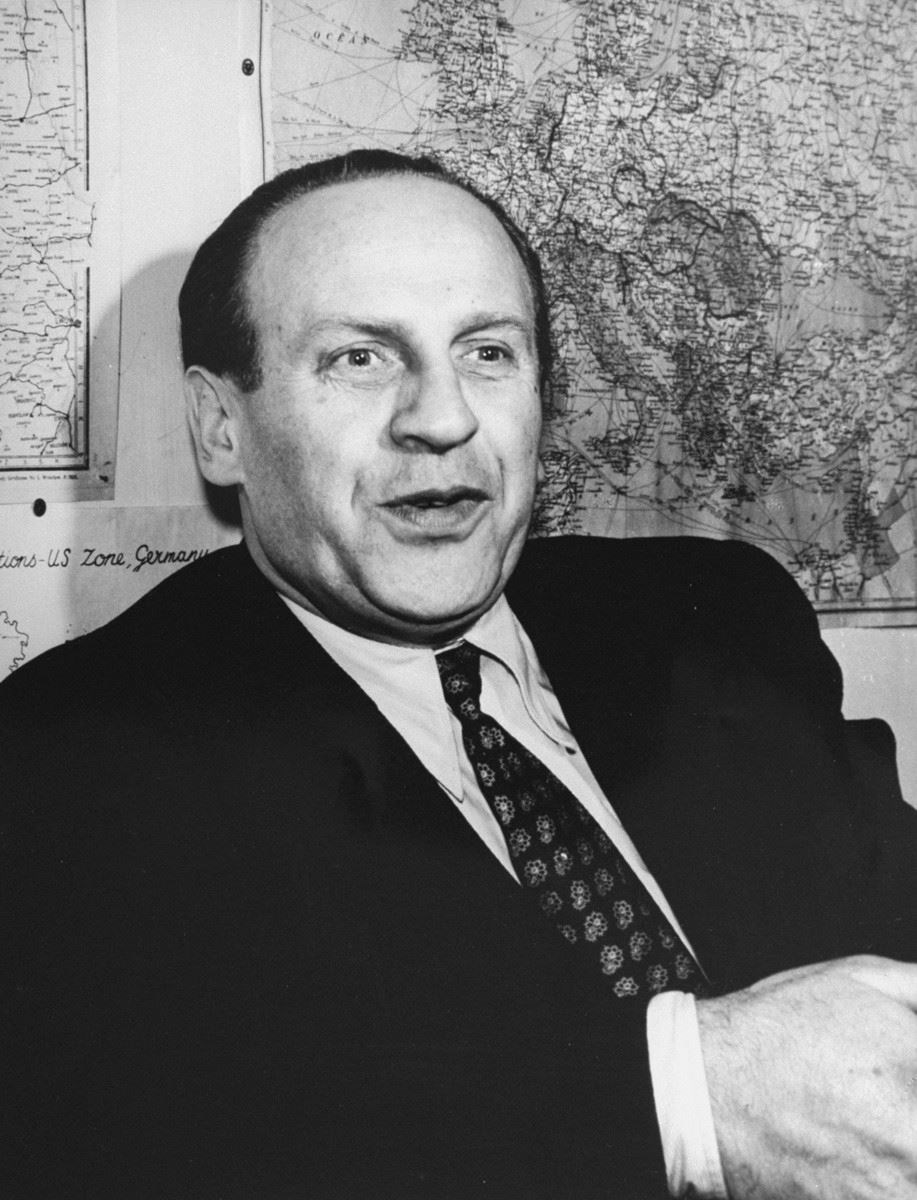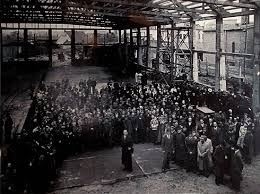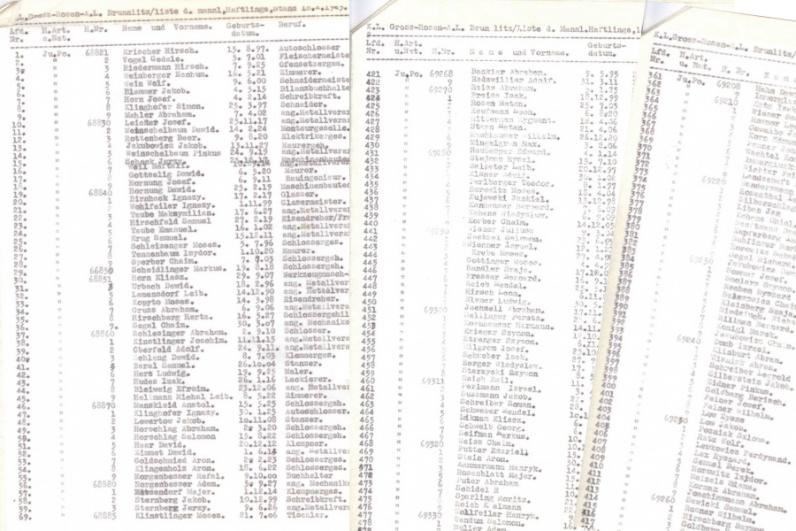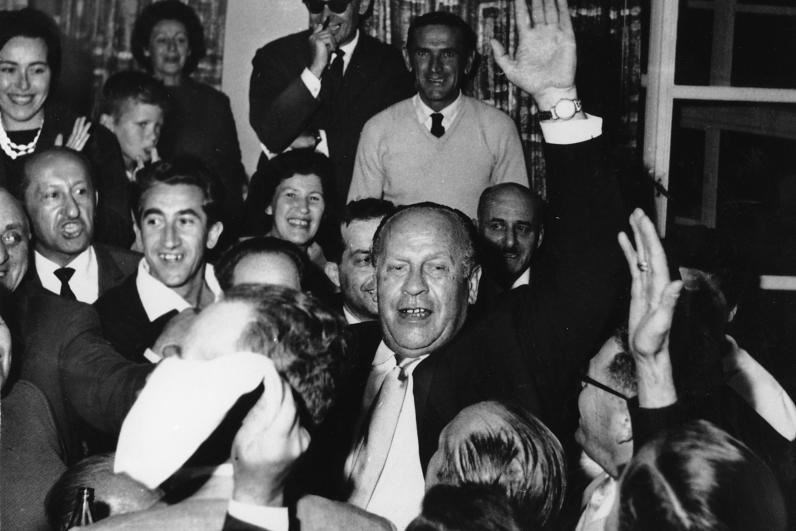 The Brave and Selfless Oskar Schindlercollections.ushmm.orgLet’s travel back in time to about 75 years ago to Poland and take a peek into the lives of a Jewish family. This family was taken by Nazi guards to be contained in a place that people had named a “concentration camp.” As soon as the four of them stepped foot onto the prison-like premises, they caught sight of the horrific reality of all the vicious rumors that had surfaced in their hometown. Weeks passed, and the family experienced more pain than they could have ever imagined. Soon enough, a Nazi guard approached them and loaded them into a train without giving any clues as to what was going on. As fear filled their bodies, they clung close to each other, afraid to let go of their strong grip. The train’s entrance swung wide open and the soldiers filed everyone out and brought them to a man who wore a suit and a strangely warm smile. What they didn't know was that this man, who stood right in front of them, would be the one to save the four of them, along with all of the other Jews who were contained alongside them. His name was Oskar Schindler. Oskar Schindler was known to be a rich businessman that society didn't think much of, which made his action to save hundreds of Jews completely unpredictable (Roberts 10). He was born in 1908 in Zwittau, Moravia, into a German family firm on Catholic beliefs (“Oskar Schindler.” UXL). After Schindler’s death in 1974, a well-known movie released in 1993, titled “The Schindler’s List”, captivated the amazing heroism of him saving 1,200 Jews from the vicious concentration camps by protecting them in a factory located in Poland in 1944 (Badertscher, Roberts 8). Schindler’s actions showed a hidden side of him that caused people to refer to him as a hero. A hero must be a brave and selfless individual whose pure intentions are to help those around them. They are willing to risk their lives to assist those in need without expecting recognition. Oskar Schindler was much more than just a shrewd businessman; he was an inspiration to all because of his extreme bravery to turn against the powerful Nazis, and his selfless personality in violent times that saved the lives of many Jews.
The Brave and Selfless Oskar Schindlercollections.ushmm.orgLet’s travel back in time to about 75 years ago to Poland and take a peek into the lives of a Jewish family. This family was taken by Nazi guards to be contained in a place that people had named a “concentration camp.” As soon as the four of them stepped foot onto the prison-like premises, they caught sight of the horrific reality of all the vicious rumors that had surfaced in their hometown. Weeks passed, and the family experienced more pain than they could have ever imagined. Soon enough, a Nazi guard approached them and loaded them into a train without giving any clues as to what was going on. As fear filled their bodies, they clung close to each other, afraid to let go of their strong grip. The train’s entrance swung wide open and the soldiers filed everyone out and brought them to a man who wore a suit and a strangely warm smile. What they didn't know was that this man, who stood right in front of them, would be the one to save the four of them, along with all of the other Jews who were contained alongside them. His name was Oskar Schindler. Oskar Schindler was known to be a rich businessman that society didn't think much of, which made his action to save hundreds of Jews completely unpredictable (Roberts 10). He was born in 1908 in Zwittau, Moravia, into a German family firm on Catholic beliefs (“Oskar Schindler.” UXL). After Schindler’s death in 1974, a well-known movie released in 1993, titled “The Schindler’s List”, captivated the amazing heroism of him saving 1,200 Jews from the vicious concentration camps by protecting them in a factory located in Poland in 1944 (Badertscher, Roberts 8). Schindler’s actions showed a hidden side of him that caused people to refer to him as a hero. A hero must be a brave and selfless individual whose pure intentions are to help those around them. They are willing to risk their lives to assist those in need without expecting recognition. Oskar Schindler was much more than just a shrewd businessman; he was an inspiration to all because of his extreme bravery to turn against the powerful Nazis, and his selfless personality in violent times that saved the lives of many Jews.
 The factory where Schindler protected and provided jobs for Jewsamericanrhetoric.comOskar Schindler’s bravery through the violent times allowed him to turn against the Nazis and save Jews. Schindler’s admission into the Nazi party was purely an act of self protection. As soon as he realized how Hitler was treating the Jews, sympathy consumed him and he worked diligently to protect the individuals. In order to protect them, he forged occupation records to deceive the Nazis and provide protection. As Steinhouse said, “Schindler succeeded in protecting his workers by keeping false records...Old people were recorded as being 20 years younger; children were listed as adults [the Nazis considered old people and children useless as workers]. Lawyers, doctors, and engineers were registered as metalworkers, mechanics, and draughtsmen—all trades considered essential to war production" (“Oskar Schindler.” UXL). In order to be able to protect the Jews, Oskar Schindler devised a plan where the Nazis would have no idea what he was up to behind the factory doors. Schindler knew that the only way he could do this was to save and forge the legal papers. However, this would be breaking the law. His tremendous bravery to follow through with an idea allowed him to be able to do it under the detection of the Nazis. As part of the Nazi party, Schindler worked for them, a circumstance most people would say was improbable for saving Jews. On the contrary, Schindler took a risk and bribed the Nazi party in order to manage the factory by himself. The factory was simply just a cover to the organization that he was running inside, which gave him the ability to save over 1,000 Jews from the violent, vicious concentration camps (Badertscher, “Oskar Schindler.” United). The Nazi party owned the factory that he managed, so they could've easily found out what was going on behind closed doors. If the Nazis found out that one of their own had turned against them and that he had used their own factory to house Jews, he would've been killed. Schindler’s brave decision saved the lives of 1,200 Jews. During this era, no one wanted to interfere or interact with the Nazis because of the brutal actions and ruthless reputation they upheld, but Schindler wasn’t bothered by that at all. He faced the Nazis and used threats against them to ensure the safety of the Jews: “By dropping the names of some of his Nazi friends and making a couple of threats, he [Schindler] was finally able to rescue the workers and escort them safely back to his factory” (“Oskar Schindler.” Encyclopedia). Schindler’s actions to save and protect Jews was brave of him. His threat to his fellow Nazi peers could have resulted in them punishing him. Knowing the violent things that the Nazis were capable of doing, it took him a lot of bravery to go through with confronting the Nazis. Oskar Schindler, a inspiration to people today and decades ago, found a way to bravely save hundreds of thousands of Jews from a situation that words cannot form to express how vicious it was.
The factory where Schindler protected and provided jobs for Jewsamericanrhetoric.comOskar Schindler’s bravery through the violent times allowed him to turn against the Nazis and save Jews. Schindler’s admission into the Nazi party was purely an act of self protection. As soon as he realized how Hitler was treating the Jews, sympathy consumed him and he worked diligently to protect the individuals. In order to protect them, he forged occupation records to deceive the Nazis and provide protection. As Steinhouse said, “Schindler succeeded in protecting his workers by keeping false records...Old people were recorded as being 20 years younger; children were listed as adults [the Nazis considered old people and children useless as workers]. Lawyers, doctors, and engineers were registered as metalworkers, mechanics, and draughtsmen—all trades considered essential to war production" (“Oskar Schindler.” UXL). In order to be able to protect the Jews, Oskar Schindler devised a plan where the Nazis would have no idea what he was up to behind the factory doors. Schindler knew that the only way he could do this was to save and forge the legal papers. However, this would be breaking the law. His tremendous bravery to follow through with an idea allowed him to be able to do it under the detection of the Nazis. As part of the Nazi party, Schindler worked for them, a circumstance most people would say was improbable for saving Jews. On the contrary, Schindler took a risk and bribed the Nazi party in order to manage the factory by himself. The factory was simply just a cover to the organization that he was running inside, which gave him the ability to save over 1,000 Jews from the violent, vicious concentration camps (Badertscher, “Oskar Schindler.” United). The Nazi party owned the factory that he managed, so they could've easily found out what was going on behind closed doors. If the Nazis found out that one of their own had turned against them and that he had used their own factory to house Jews, he would've been killed. Schindler’s brave decision saved the lives of 1,200 Jews. During this era, no one wanted to interfere or interact with the Nazis because of the brutal actions and ruthless reputation they upheld, but Schindler wasn’t bothered by that at all. He faced the Nazis and used threats against them to ensure the safety of the Jews: “By dropping the names of some of his Nazi friends and making a couple of threats, he [Schindler] was finally able to rescue the workers and escort them safely back to his factory” (“Oskar Schindler.” Encyclopedia). Schindler’s actions to save and protect Jews was brave of him. His threat to his fellow Nazi peers could have resulted in them punishing him. Knowing the violent things that the Nazis were capable of doing, it took him a lot of bravery to go through with confronting the Nazis. Oskar Schindler, a inspiration to people today and decades ago, found a way to bravely save hundreds of thousands of Jews from a situation that words cannot form to express how vicious it was.
 A copy of one of Schindler's listsnewsweek.comWhile in the process of developing the ever so famous “Schindler’s List,” Oskar Schindler was selfless and didn't think twice about how his actions would bring him praise. In fact, he remained selfless and focused on saving Jews from their horrific conditions. Schindler was known to be a greedy businessman by those around him. After the Nazi’s had given Schindler a factory of his own to earn a profit for them, they soon offered him a deal in which they'd take over his factory and increase the amount on his paycheck: “He proposed establishing a labor subcamp within his factory that would continue to employ his own workers” (“Oskar Schindler.” Encyclopedia). People in the Nazi Party tried to convince Schindler to let them employ his factory, but he refused, even though it would benefit his personal banking account. Schindler was known to be a very greedy and rich person, so it was a big deal for him to decline this offer. It shows how selfless his actions were because he declined one of his prized possessions, money, to save the lives of people that he wasn't even supposed to like. In addition, people thought that Schindler’s actions to save the Jews was just a way to receive honor and praise from those who weren't fond of him. But what they don't realize is that he sacrificed everything he had for 1,200 Jews. He did it all in a selfless manner by only focusing on the lives of the Jews. In the process of transporting Jews from concentration camps, Oskar Schindler was offered opportunities on multiple occasions that had the possibility of making him an even richer businessman (Roberts 39). Along with that, he risked all of his prized possessions by breaking the law in order to house the Jews (OSKAR SCHINDLER SAVED). Schindler was thought to be very fond of money and living the rich life, but his two actions begged to differ. First, he risked losing everything to forge Jew identification documents. Then, his true and genuine character really shone through when he was given a lot of money, but he rightfully used it for its true purpose instead of taking it all to himself. As the Jews were unloaded from the trains, they were completely shocked as to who was there to help save all of their lives: “Schindler's Jewish workers ‘could not understand the reasons, they recognized that [Schindler] was somehow protecting them [from the Nazis]. An air of [partial] security grew in the factory and the men soon sought permission to bring in families and friends to share in their comparative haven.’ By the end of 1942, Schindler was employing 370 Jews” (“Oskar Schindler.” UXL). Even his Jewish workers were extremely shocked when they examined and experienced Schindler’s actions. Their reaction to his operation clearly showed how pure Schindler’s intentions were. None of this was expected of him, yet he still found it in himself to help the suffering people. There was no way he would have benefited financially or socially from this with his society, but he did it anyway. Oskar Schindler’s selfless actions allowed all those lives to be saved while trampling over his old reputation to behold a changed man.
A copy of one of Schindler's listsnewsweek.comWhile in the process of developing the ever so famous “Schindler’s List,” Oskar Schindler was selfless and didn't think twice about how his actions would bring him praise. In fact, he remained selfless and focused on saving Jews from their horrific conditions. Schindler was known to be a greedy businessman by those around him. After the Nazi’s had given Schindler a factory of his own to earn a profit for them, they soon offered him a deal in which they'd take over his factory and increase the amount on his paycheck: “He proposed establishing a labor subcamp within his factory that would continue to employ his own workers” (“Oskar Schindler.” Encyclopedia). People in the Nazi Party tried to convince Schindler to let them employ his factory, but he refused, even though it would benefit his personal banking account. Schindler was known to be a very greedy and rich person, so it was a big deal for him to decline this offer. It shows how selfless his actions were because he declined one of his prized possessions, money, to save the lives of people that he wasn't even supposed to like. In addition, people thought that Schindler’s actions to save the Jews was just a way to receive honor and praise from those who weren't fond of him. But what they don't realize is that he sacrificed everything he had for 1,200 Jews. He did it all in a selfless manner by only focusing on the lives of the Jews. In the process of transporting Jews from concentration camps, Oskar Schindler was offered opportunities on multiple occasions that had the possibility of making him an even richer businessman (Roberts 39). Along with that, he risked all of his prized possessions by breaking the law in order to house the Jews (OSKAR SCHINDLER SAVED). Schindler was thought to be very fond of money and living the rich life, but his two actions begged to differ. First, he risked losing everything to forge Jew identification documents. Then, his true and genuine character really shone through when he was given a lot of money, but he rightfully used it for its true purpose instead of taking it all to himself. As the Jews were unloaded from the trains, they were completely shocked as to who was there to help save all of their lives: “Schindler's Jewish workers ‘could not understand the reasons, they recognized that [Schindler] was somehow protecting them [from the Nazis]. An air of [partial] security grew in the factory and the men soon sought permission to bring in families and friends to share in their comparative haven.’ By the end of 1942, Schindler was employing 370 Jews” (“Oskar Schindler.” UXL). Even his Jewish workers were extremely shocked when they examined and experienced Schindler’s actions. Their reaction to his operation clearly showed how pure Schindler’s intentions were. None of this was expected of him, yet he still found it in himself to help the suffering people. There was no way he would have benefited financially or socially from this with his society, but he did it anyway. Oskar Schindler’s selfless actions allowed all those lives to be saved while trampling over his old reputation to behold a changed man.
 Schindler is surrounded by over 1,000 of the Holocaust survivors that he savednewsweek.comOskar Schindler, a businessman in Poland, was an inspiration to people in the past and present. Knowing of the power and capabilities that Hitler and the Nazis had, he still chose to risk his life and conspire against them. That type of bravery cannot isn’t conveyed by most people. Even Jews were confused as to why someone like Schindler would be brave enough to even consider helping them (“Oskar Schindler.” UXL). Along with braveness, his selflessness made his actions even more heroic. All of his life, Schindler had been focused merely on the idea of making money. So when the Nazi party offered to increase his paycheck in order to take over the operation that they were unaware of, Schindler turned down the offers (Badertscher, OSKAR SCHINDLER SAVED, Roberts 39). Since he turned down all those opportunities to make more money, he ended up losing everything and died alone (“Oskar Schindler.” United). Schindler’s reveal of his pure and true personality shows that anyone can be a hero and help those who are struggling and in need. That family that we saw in the beginning showed us the true way Schindler’s actions affected people’s lives emotionally and physically. He was a powerful individual whose brave personality gave him the ability to turn against Hitler and, additionally, his selflessness allowed him to not pause to think about how saving lives would positively or negatively affect his life. Oskar Schindler’s actions aren’t seen on a daily basis. And because of that, I believe that Schindler is one of the most influential and inspirational individuals in our society. Schindler has inspired me to be brave in times of difficulty and to do more noble actions in life, big or small. Though not many people know of him and the wonderful things that he has done, he remains a hero and inspiration to people. Hopefully, one day, we will all be able to do something as brave and selfless as Schindler and impact our society for the better.
Schindler is surrounded by over 1,000 of the Holocaust survivors that he savednewsweek.comOskar Schindler, a businessman in Poland, was an inspiration to people in the past and present. Knowing of the power and capabilities that Hitler and the Nazis had, he still chose to risk his life and conspire against them. That type of bravery cannot isn’t conveyed by most people. Even Jews were confused as to why someone like Schindler would be brave enough to even consider helping them (“Oskar Schindler.” UXL). Along with braveness, his selflessness made his actions even more heroic. All of his life, Schindler had been focused merely on the idea of making money. So when the Nazi party offered to increase his paycheck in order to take over the operation that they were unaware of, Schindler turned down the offers (Badertscher, OSKAR SCHINDLER SAVED, Roberts 39). Since he turned down all those opportunities to make more money, he ended up losing everything and died alone (“Oskar Schindler.” United). Schindler’s reveal of his pure and true personality shows that anyone can be a hero and help those who are struggling and in need. That family that we saw in the beginning showed us the true way Schindler’s actions affected people’s lives emotionally and physically. He was a powerful individual whose brave personality gave him the ability to turn against Hitler and, additionally, his selflessness allowed him to not pause to think about how saving lives would positively or negatively affect his life. Oskar Schindler’s actions aren’t seen on a daily basis. And because of that, I believe that Schindler is one of the most influential and inspirational individuals in our society. Schindler has inspired me to be brave in times of difficulty and to do more noble actions in life, big or small. Though not many people know of him and the wonderful things that he has done, he remains a hero and inspiration to people. Hopefully, one day, we will all be able to do something as brave and selfless as Schindler and impact our society for the better.
Works Cited
Badertscher, Eric. “Oskar Schindler.” EBSCO Biography Reference Center , 1 Aug. 2017,
web.a.ebscohost.com/brc/detail?vid=5&sid=22cdd956-8384-402b-ac7e-f2bcfff31ec3%40sessionmgr4006&bdata=JnNpdGU9YnJjLWxpdmU%3d#AN=15316287&db=b6h.
"Oskar Schindler." Encyclopedia of World Biography, vol. 18, Gale, 1998. Biography In Context,
https://link.galegroup.com/apps/doc/K1631005876/BIC?u=powa9245&sid=BIC&xid=4f5
0fa5d. Accessed 3 May 2018.
“OSKAR SCHINDLER, SAVED 1,200 JEWS.” The New York Times, The New York Times, 13
Oct. 1974,
“Oskar Schindler.” United States Holocaust Memorial Museum, United States Holocaust
Memorial Museum, www.ushmm.org/wlc/en/article.php?ModuleId=10005787.
“Oskar Schindler." UXL Biographies, UXL, 2011. Student Resources In Context,
https://link.galegroup.com/apps/doc/EJ2108102040/SUIC?u=powa9245&sid=SUIC&xid=8acf92fd. Accessed 3 May 2018.
Roberts, Jack L. The Importance of Oskar Schindler. Lucent Books, 1996.
Page created on 5/22/2018 4:43:16 AM
Last edited 5/24/2018 9:11:23 PM
